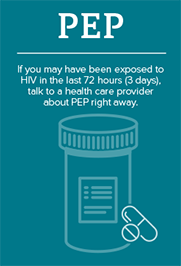
What is PEP?
PEP stands for post-exposure prophylaxis. It means taking antiretroviral medicines (ART) after being potentially exposed to HIV to prevent becoming infected.
PEP must be started within 72 hours after a recent possible exposure to HIV, but the sooner you start PEP, the better. If you’re prescribed PEP, you’ll need to take it once or twice daily for 28 days. PEP is effective in preventing HIV when administered correctly, but not 100%.
Is PEP right for you?
If you’re HIV-negative or don’t know your HIV status, and in the last 72 hours you:
- Think you may have been exposed to HIV during sex (for example, if the condom
broke), - Shared needles and works to prepare drugs (for example, cotton, cookers, water), or
- Were sexually assaulted,
talk to your health care provider about PEP right away.
PEP should be used only in emergency situations and must be started within 72 hours after a recent possible exposure to HIV. It is not a substitute for regular use of other proven HIV prevention methods, such as pre-exposure prophylaxis (PrEP), which means taking HIV medicines daily to lower your chance of getting infected; using condoms the right way every time you have sex; and using only your own new, sterile needles and works every time you inject.
PEP is effective, but not 100%, so you should continue to use condoms with sex partners and safe injection practices while taking PEP. These strategies can protect you from being exposed to HIV again and reduce the chances of transmitting HIV to others if you do become infected while you’re on PEP.
Can I take a round of PEP every time I had unprotected sex?
PEP should be used only in emergency situations.
PEP is not the right choice for people who may be exposed to HIV frequently—for example, if you often have sex without a condom with a partner who is HIV-positive. Because PEP is given after a potential exposure to HIV, more drugs and higher doses are needed to block infection than with PrEP, or pre-exposure prophylaxis. PrEP is when people at high risk for HIV take HIV medicines daily to lower their chances of getting HIV. If you are at ongoing risk for HIV, speak to your doctor about PrEP. Also, read our section on PrEP.
Where can I get PEP?
The individual page of the PrEP provider in our Locator provides information on PEP availability.
Content source: World Health Organisation, Centers for Disease Control & Prevention